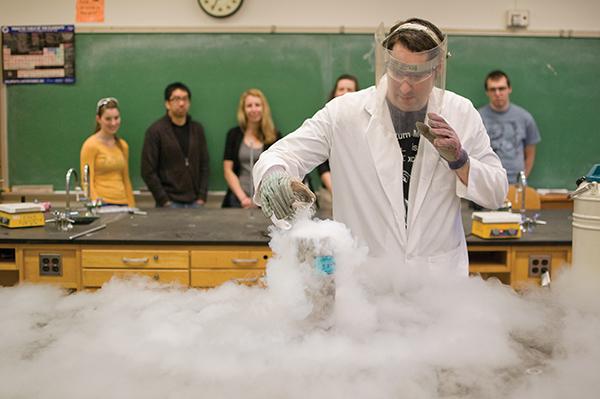Club says chemistry is more than formulas and lectures

Chemistry Club:Jason Fell, senior chemistry major and president of the Chemistry Club, demonstrates what happens when boiling water and freezing liquid nitrogen are combined.:Robert Linggi – State Hornet
March 9, 2010
If members of the Chemistry Club are not entertaining elementary school students with slimy science experiments, they are likely having just as much fun amongst themselves within chemically scented laboratories in Sequoia Hall.
This particular club at Sacramento State prides itself on attracting new freshmen chemists and reaching out to younger, aspiring scientists.
“We try to spread knowledge of what a chemistry degree can do,” said Jason Fell, senior chemistry major and president of Chemistry Club. “Our goal is to promote chemistry and all its wonder, get people to become chemistry majors, explaining to people what a chemical education can lead to.”
Youth outreach events, like putting on science displays at local elementary schools and setting off chemical explosions in the downtown mall, are geared toward bringing new students into the sciences, members said.
“So we try to get young kids interested in chemistry which makes a really big difference. We get a lot of freshmen coming to us and they’re really enthusiastic about chemistry. That’s because they had that chemistry teacher who made the difference for them. So I think if we could do that for younger kids, that’s really awesome.”
Robert Rose, chemical engineering major, said middle-schoolers recently attended a Chemistry Club demonstration at Sac State involving dry ice, balloons and freezing matter with liquid nitrogen and another experiment that resulted in a root beer float.
“When working with kids, sometimes we actually have a lot more fun than they do because we get to educate them and we still will do our own little experiments on the side,” Rose said. “They enjoy it quite a bit. You can definitely see it on their faces.”
Fell said the club’s main focus is on showing how chemistry goes beyond sitting in a lab or lecture hall and is mostly hands-on.
At time same time, he said, the club gives aspiring scientists a place to socialize, “talk chem” and tutor each other.
Fell said club meetings are held every other Monday in Sequoia Hall, Room 31.
Students and staff are often available to help tutor students during these club meetings, he said, which is really beneficial to the chemistry department’s success.
The recruited freshmen benefit from these sessions.
At their most recent meeting, Fell said, members were charged up for their next demonstration: the science behind lightning and thunder.
“We’re going to teach a sixth grade class about weather chemistry, which is perfect considering what’s been outside lately,” Fell said. Rose said many students may not do well with science in high school so they drift away from the subject altogether.
“We’re here to keep them interested in that subject matter so that they’ll consider it in the future as a possible career or as an academic option,” Rose said.
Author can be reached at [email protected]






















































































































